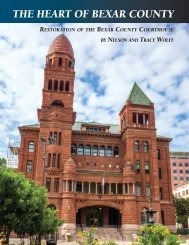Notable New Orleanians: A Tricentennial Tribute
An illustrated history of New Orleans paired with the histories of companies that have helped shape the city.
An illustrated history of New Orleans paired with the histories of companies that have helped shape the city.
Create successful ePaper yourself
Turn your PDF publications into a flip-book with our unique Google optimized e-Paper software.
first president of the Levee Board. By the spring of 1892, the board had built over twenty-one miles<br />
of levees using 314,257 cubic yards of earth. All the levees along both river banks as well as the<br />
Old and <strong>New</strong> Basin Canals were expected to be completed in 1892.<br />
In 1896, Dreyfous turned to city politics and ran successfully for the City Council. From that<br />
position he wrote a bill for the legislature to establish the nine-member Drainage Commission of<br />
<strong>New</strong> Orleans with a variety of funding sources, power of expropriation, and right to use city<br />
streets. In 1899, it became part of the new Sewerage and Water Board. No member of the new<br />
board was to receive compensation; meetings were to be open to the public, and contracts by<br />
sealed public bid. Its central power was the authority to compel all premises in the City of <strong>New</strong><br />
Orleans to connect to the Sewerage and Water system.<br />
As president of the Levee Board Dreyfous had observed how detrimental to business the port’s<br />
wharf leasing system had become. His campaigning led the State Legislature to step in and create<br />
the Board of Commissioners of the Port of <strong>New</strong> Orleans (Dock Board), the public agency that has<br />
successfully operated the docks throughout the twentieth century.<br />
In 1891, Dreyfous helped organized the City Park Improvement Association. Felix J. Dreyfous,<br />
the most influential of all City Park leaders, served as acting president and then president for seventeen<br />
years. He was a member of the board for fifty-five years, from its start in 1891 until his<br />
death in 1946. His son Julius Dreyfous served after his father for another fifty years. Dreyfous had<br />
three children, but no grandchildren survive him.<br />
<br />
Felix Dreyfous.<br />
FROM THE ARCHIVES OF TOURO INFIRMARY.<br />
1 An Act Creating a Police Board for the City of <strong>New</strong> Orleans.... No. 63, approved July 11, 1888.<br />
2 Dreyfous files, Levee Bd.<br />
<br />
G RACE<br />
K ING<br />
(1852-1932)<br />
Grace King filtered the Southern past to produce a beautiful corpus of writings exalting her ancestors.<br />
They were the ancestors of many in Louisiana. While King is notable as the champion of “the Lost<br />
Cause,” a more appealing quality is an appreciation of racial harmony found in some of her works. She<br />
contrasts with Alice Dunbar-Nelson (q.v.) whose works turned often on tragic individual conflicts.<br />
A Protestant Anglo-Saxon, King lacked the Catholicism that animated much Creole writing. Still,<br />
one of her two best books, Creole Families of <strong>New</strong> Orleans, is the standard introduction to Creoles of<br />
white extraction. Following World War I African-Americans of mixed race appropriated the term<br />
Creole since their ancestry also extended before the war. As Alcée Fortier (q.v.) has shown, the Creole<br />
language of the blacks was quite old and was not dependent on a mixed race ancestry. In Monsieur<br />
Motte King restricts her use of Creole to the language or to whites, as when she wrote of the school<br />
girls’ mothers who were once, “little creoles like themselves.” In The Pleasant Ways of St. Medard King<br />
writes …“pretty dancing Creole girls of Monsieur Pinseau’s dancing days….” 1<br />
Grace King considered herself a Creole based entirely on her parent’s residence in <strong>New</strong> Orleans<br />
prior to the Civil War. Her father seems to have been a stern Protestant and her mother a rather<br />
subservient creature with a surprising fund of stories exalting the old days. That King became a<br />
writer might be attributed to her father’s straightened post-war circumstances, but her natural<br />
story-telling seems inevitably to have led to literature. Charles Gayarré (q.v.) was a close friend of<br />
her father, inviting the young Grace and her sister to spend summers at his plantation. In the mid<br />
1880s George Washington Cable’s (q.v.) accounts of mixed-race Creoles were much resented by the<br />
white Creoles and led to the first stories collected in Monsieur Motte. Cable and King had similar<br />
trajectories moving through the genre from local color to history. Cable left <strong>New</strong> Orleans permanently<br />
because of his definition of Creole, while King remained exalted.<br />
BIOGRAPHIES<br />
87
















